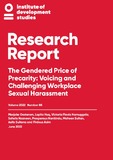The Gendered Price of Precarity: Voicing and Challenging Workplace Sexual Harassment

Download
Date
2022-06-07Author
Oosterom, Marjoke
Huq, Lopita
Namuggala, Victoria
Nazneen, Sohela
Nankindu, Prosperous
Sultan, Maheen
Sultana, Asifa
Azim, Firdous
Metadata
Show full item recordImpact
Abstract
There is a strong belief that employment is a crucial avenue for the empowerment of young women, through income, greater autonomy, and bargaining power within the family. However, experiences of workplace sexual harassment undermine these potential gains. This qualitative study among agro-processing factory workers and domestic workers in Uganda and Bangladesh demonstrates that sexual harassment is widespread in both formal and informal workplaces, while domestic workers are particularly vulnerable to its most severe forms. Women’s agency to challenge harassment is severely constrained by social and
gender norms. Most find that the best possible strategy is to avoid and prevent physical forms of sexual harassment from happening. Language is essential for voicing and challenging sexual harassment, but the study shows that social and gender norms constrain young women in articulating transgressive and inappropriate behaviour by men. Many women hide detail, deliberately use euphemisms, and even lack a vocabulary to explain what happened to them, ultimately limiting opportunities for redressal. At the same time, formal institutions are failing young female workers. Local authorities in both countries reproduced prejudice about women ‘inviting’ sexual attention, whereas the police are generally distrusted because of corruption and the need for bribes. To tackle sexual harassment in the workplace, multipronged strategies are needed that target employers and government actors. The right policies and adequate safeguarding and reporting mechanisms need to be implemented, whereas programmes need to support women to help them gain the confidence to speak about sexual harassment and support (collective) action. Longer-term strategies need to address gender norms that condone sexual harassment.
Citation
Oosterom, M.; Huq, L.; Namuggala, V.; Nazneen, S.; Nankindu, P.; Sultan, M.; Sultana, A. and Azim, F. (2022) The Gendered Price of Precarity: Voicing and Challenging Workplace Sexual Harassment, IDS Research Report 88, Brighton: Institute of Development Studies, DOI: 10.19088/IDS.2022.030DOI
10.19088/IDS.2022.030Is part of series
IDS Research Report;88Rights holder
Institute of Development StudiesRights details
http://creativecommons.org/licenses/by-nc/4.0/Sponsor
British Academy (Grant reference number YF/190009)Collections
- IDS Research [1671]
Except where otherwise noted, this item's license is described as This is an Open Access report distributed under the terms of the Creative Commons Attribution Non Commercial 4.0 International licence (CC BY-NC), which permits use, distribution and reproduction in any medium, provided the original authors and source are credited, any modifications or adaptations are indicated, and the work is not used for commercial purposes.

